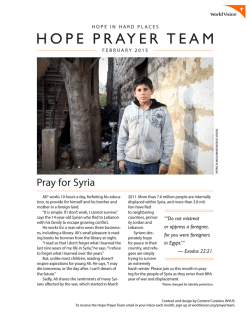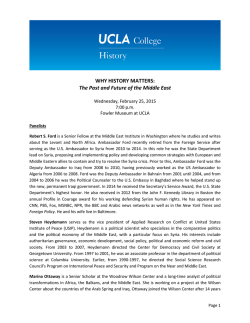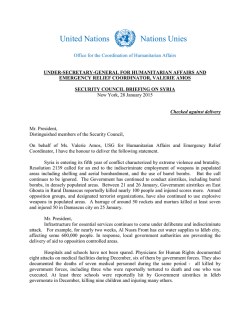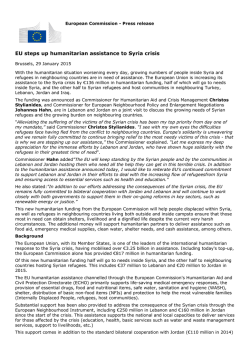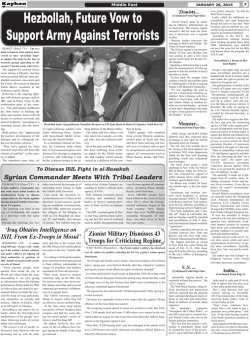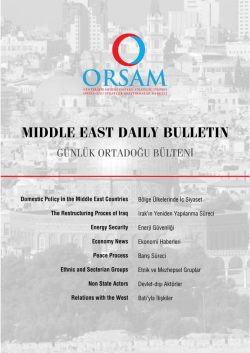
With allies like these
Gulf Daily News Sunday, 1st February 2015 With allies like these... T n A rally urging us to minimise the environmental impact on the planet while we all need to make lifestyle changes, saving the planet doesn’t have to mean giving up the things you love. Simple and immediate ways that you can reduce your carbon footprint include being energy efficient, using renewable energy and making better travel choices. One of the greatest day-to-day positive impacts you can have is simply to be an informed and selective shopper. Your position as a consumer gives you tremendous power. If you reject food and goods produced in an unsustainable manner, and instead choose environmentally friendly alternatives, the companies will listen – and change their practices. Reduce, reuse and recycle. This mantra should be first and foremost when making decisions as part of our daily lives – at work, on vacation, when we’re out shopping, and at home. Jameela Mohanna Splendid news with interest that the political opposiI24read tion had called for an ‘economic boycott’ for hours between January 27 and 28 (GDN, January 28). The boycott reportedly called for people to “halt all financial transactions” on the boycott day. This was an extremely timely innovation falling as it does on pay day. Most months, I spend hours waiting in line at the bank on salary day, but this month was a breeze as thousands of opposition supporters boycotted the banks. What a refreshing change. Runneymede Court on tape ICK Kyrgios was not even born when N John McEnroe was ejected from the 1990 Australian open for miserably bad behaviour. One hopes he hasn’t seen the footage either, because if he has, it suggests his choice of role models does not match his gift for tennis. To recap: McEnroe, playing Sweden’s Mikael Pernfors in the fourth round at Melbourne, and apparently believing he could get away with three code violations before being disqualified, duly misbehaved. He intimidated a line judge by bouncing a ball in her face. And then, because the maximum number of violations had in fact recently been cut by one, 1996 – President Jacques debris across Texas and Chirac announces that Louisiana states. France has finished its 2004 – US President nuclear testing “once and George W Bush, unMARRIAGE always demands the finest for all.” der mounting political arts of insincerity possible between 1997 – An Air Senegal pressure, plans to sign two human beings - Vicki Baum, an executive order to plane carrying European tourists crashes in Senestablish a full-blown Austrian-born author (1888-1960). egal, killing at least 20 investigation of US inpeople and injuring 30. telligence failures that 1998 – Miguel Angel Rodriguez wins the presidency in led to the invasion of Iraq. Costa Rica. 2005 – Rebels attack a Colombian military post in south1999 – Thousands of people flee the capital of Guinea-Biswest Colombia with homemade rockets, killing nine solsau as fighting intensifies between loyalist and rebel forcdiers and wounding 20. es. 2006 – A US government audit finds guerilla attacks in 2001 – US President George W Bush unveils a plan to Iraq have forced the cancellation of more than 60 per cent spend $1 billion over five years on the New Freedom Initiof water and sanitation projects, in part because American ative, programmes to help disabled Americans buy homes intelligence failed to predict the brutal insurgency. and stay in the workforce. 2007 – Suspected Muslim guerillas storm a Philippine 2002 – Fighters loyal to Afghan warlord Bacha Khan rejail in the southern city of Kidapawan and blast a hole treat from the city of Gardez, the capital of Paktia province, through a wall, freeing three alleged bombers and dozens after several days of heavy fighting between his forces of other inmates. and the local council, which rejects his leadership. About 2008 – Two female suicide bombers with a history of psy60 people are killed. chiatric treatment kill almost 100 people at two pet mar2003 – The US space shuttle Columbia breaks apart as it kets in central Baghdad. Iraqi and US officials have said the re-enters Earth’s atmosphere at the end of a 16-day scienwomen may have been unwitting bombers strapped with tific mission, killing its seven crew members and scattering remote-control explosives. a speechless and ashen McEnroe was thrown out of the tournament. On Sunday, the 19-year-old Kyrgios swore too often to keep count, and not always at himself. At one point in set four of a five-set thriller against Andreas Seppi, the young Australian told a member of the audience to put away his “f****** phone”. He yelled at three others for daring to try to leave the ground. He broke a racket. He was curt and impatient with the ball boys and girls, but was allowed to finish the match and lost to Andy Murray in the quarter-final. Kyrgios is a rare talent, but like the young Murray and the not-so-young McEnroe before him, he has yet to master his emotions. He is dancing a fine line between condemnation for failing to grow up and indulgence for being brilliant. There is not much appetite for a return to the rigid rules and fatuous formality of Wimbledon in 1932, when shorts were worn there for the first time. And there are times when brilliance is worth covering your children’s ears for. But there is no excuse for being rude to ball boys. Next time you’re in SW19, Kyrgios, don’t bark. You could even try “towel please”. Armchair tennis lover 2009 – Gunman abducts American UN worker John Solecki in Quetta, Pakistan, and kills his driver. 2010 – A female suicide bomber detonates her explosives inside a way station for Shi’ite pilgrims in Iraq, killing 54 people and rattling security officials, who are struggling against a possible rise in violence before key elections next month. 2011 – President Hosni Mubarak announces he will not run for a new term in September elections but rejects protesters’ demands he step down immediately and leave the country, vowing to die on Egypt’s soil, after a dramatic day in which a quarter-million Egyptians stage their biggest protest yet calling on him to go. 2012 – At least 74 people are killed and 248 injured after soccer fans rush the field in the seaside city of Port Said following an upset victory by the home team over Egypt’s top club, setting off clashes and a stampede as riot police largely fail to intervene. 2013 – Hillary Rodham Clinton formerly resigns as US secretary of state, capping a four-year tenure that saw her shatter records for number of countries visited. John Kerry was sworn in to replace her. 2014 – Syrian military helicopters drop barrels packed with explosives in the government’s latest air raids on rebel-held areas of the northern city of Aleppo, killing at least 23 people. By G D urkey’s Prime Minister Ahmet Davutoglu was in London last week, telling the Western media how helpful Ankara had been in the struggle against the terrorist Islamic State (IS) that has emerged in northern Syria and Iraq. “Turkey is doing everything it can, although, of course, we cannot put troops everywhere on the border," he said. Turkey's open border has become a sore point with its Western allies, who suspect that President Recep Tayyip Erdogan is deliberately allowing a steady flow of recruits and supplies to IS because he still wants the Sunni rebels, most of whom are jihadi extremists, to overthrow Bashar Al Assad, Syria's Shi’ite ruler. (Erdogan is no jihadi, but he is a devout and militant Sunni Islamist.) But Erdogan's motives are irrelevant, because Turkey simply cannot put troops everywhere on its 820km border with Syria. Or so says Ahmet Davutoglu, and only an enemy of Turkey (or somebody with a grasp of basic mathematics) would say otherwise. I am no enemy of Turkey, but I can do basic arithmetic. If you stationed Turkish troops along the entire length of the Syrian border at 10 metre intervals – that's enough for a machine-gun nest every 50m – it would take about 82,000 soldiers to cover the entire 820km stretch. The strength of the Turkish army (never mind the navy and air force) is 315,000 soldiers. Even if you allow for frequent rotation of the soldiers manning the border, it would take much less than half the strength of the Turkish army to shut the border to foreign fighters. Maybe a few jihadis would still get through, but the vast majority wouldn't. The only reason Ankara doesn't shut the border is that it doesn't really want to. Cutting off the flow of jihadi volunteers to Syria would not greatly change the local military balance – IS uses them mostly as mere cannon-fodder. The point is that Turkey is not fully committed to the destruction of IS, and indeed will give IS deniable help in order to further the goal of a Sunni victory in Syria, despite being part of a "coalition of the willing" that is nominally dedicated to destroying IS. Then there's Iran. In Iraq, where IS controls half the country’s territory and threatens a Shi’ite-dominated regime, Iran and the US are fighting almost sideby-side to defend Prime Minister Haidar Al Abadi's government. (They don't actually talk to each other, but tell the Iraqis where they are planning to bomb so there are no collisions over the target areas.) But next-door, in Syria, it's different. Iran has sent troops, weapons and money to defend Assad's regime, while the US is still pledged to overthrow it. They both see IS (which controls about a third of Syria's territory) as an enemy, but Washington still believes that it can create some other, more "moderate" army of Sunni rebels that will eventually take Assad down. And so on, and so forth. Not one of the major outside powers that is opposed to IS in principle has a clear strategy for fighting it, nor are they willing to co-operate with one another. So IS will survive, at least for some years to come, despite the horrors it inflicts on innocent people under its control. It may even expand a bit more, though the end of the siege of Kobane shows that it is far from unstoppable. 7
© Copyright 2026

